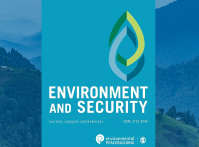ECSP Director Geoff Dabelko was recently a guest on
The Diane Rehm Show to discuss the just-released U.S. intelligence community assessment of world water security. He was joined by co-panelists retired Maj. Gen. Richard Engel (USAF) of the
National Intelligence Council’s Environment and Natural Resources Program (a key figure in preparing the report), Jessica Troell of the International Water Program at the
Environmental Law Institute, and Steve Fleischli of the
Natural Resources Defense Council.
The Department of State-requested assessment (outlined in more detail, here and here) is a very positive contribution, said Dabelko. It “moves away from the arm-waving, headline-grabbing, water wars frame – the kind of sky-is-falling frame that is intuitively appealing and certainly appealing for politicians and headline writers, but doesn’t really reflect the reality.” He continued:
What this report instead does, is recognize that there’s been an awful lot of cooperation around water even in the face of scarcity and that that cooperation in part helps us avoid conflicts, whether they’re violent or political, and that we should invest in those institutions that help us get to cooperation.
It also suggests that it’s inadequate and incorrect to think of water as just a single-sector issue. The report is quite clear in connecting it to energy, connecting it to food, connecting it to health, economic development, agriculture obviously, and so that recognition [in] analysis sounds in some way straightforward, but unfortunately, when we organize our responses, we often respond in sector, and there’s not nearly enough communication and cooperation.
And finally, the report does say that the future may not look like the past, and so while we don’t have evidence of states fighting one another over water – and the judgment of the report is in the next 10 years, we won’t see that – it does hold out the prospect for as we go farther down the line, in terms of higher levels of consumption and higher levels of population, that we need to pay special attention because there’s some particular river basins in parts of the world where, as I said, the future may not look like the past and we have greater concerns for higher levels of conflict.
Visit the show’s program page to listen to the full segment, or read the transcript here.
Sources/Image Credit: The Diane Rehm Show.

 A Publication of the Stimson Center.
A Publication of the Stimson Center.







